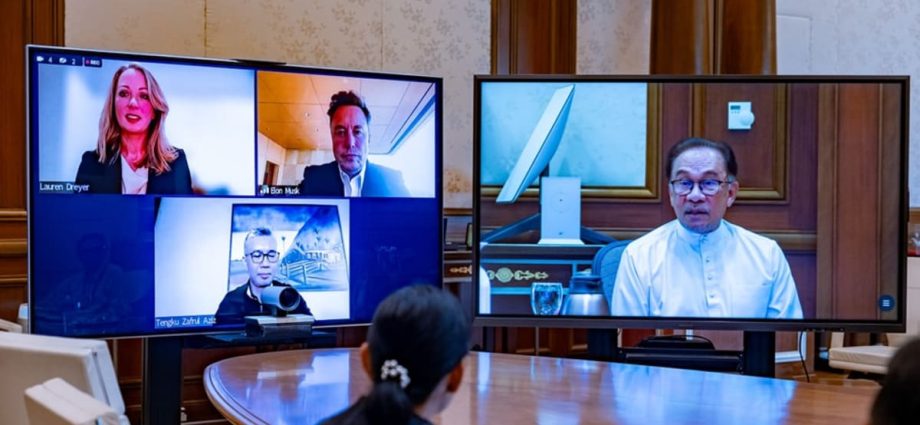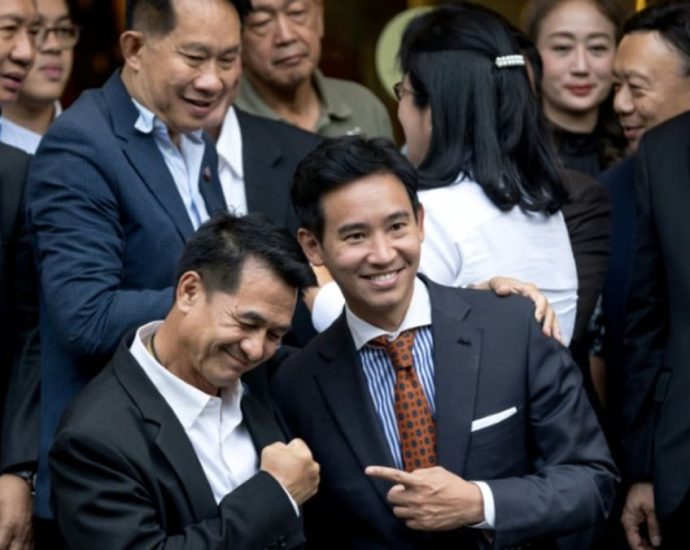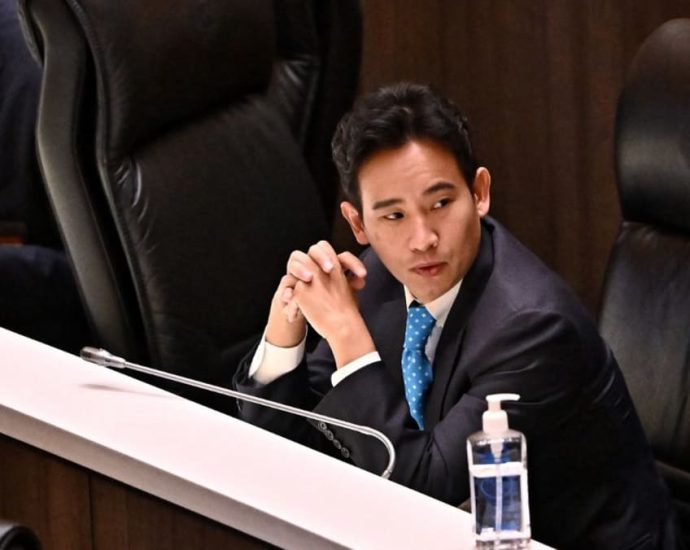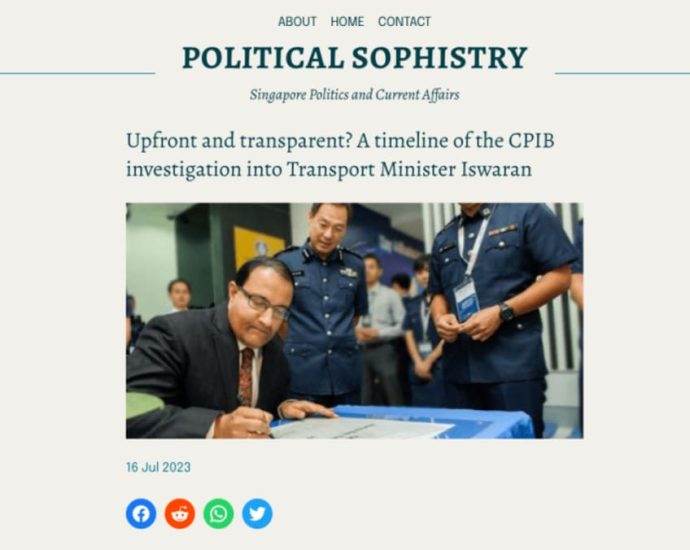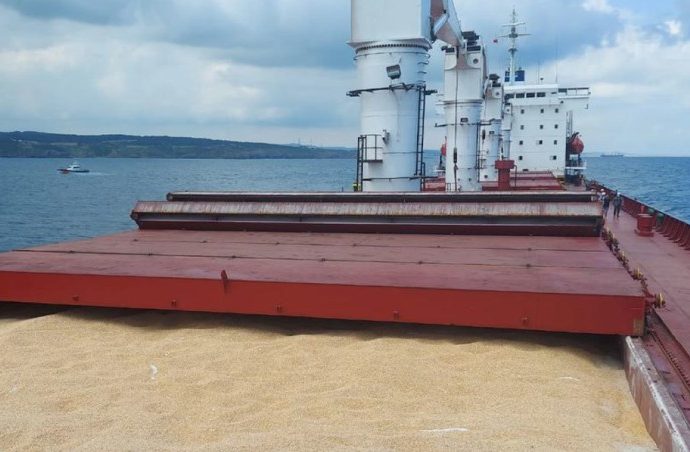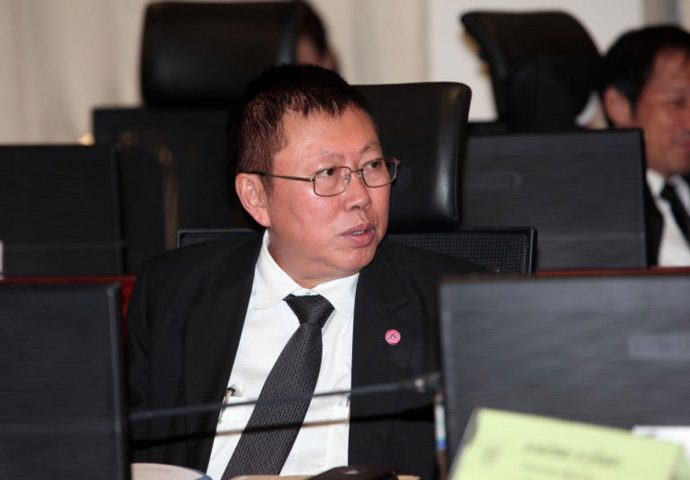Malaysia issues licence to Elon Musk’s Starlink to bring internet services to remote areas
KUALA LUMPUR: Malaysia has issued a licence to Starlink, the satellite communications service started by Elon Musk, to provide internet services in the country, particularly in remote areas, its communications minister said on Thursday (Jul 20). Minister Fahmi Fadzil said in a Facebook post that Starlink, which is operated byContinue Reading
Malaysia issues license to Elon Musk’s Starlink to bring internet services to remote areas
KUALA LUMPUR: Malaysia has issued a license to Starlink, the satellite communications service started by Elon Musk, to provide internet services in the country, particularly in remote areas, its communications minister said on Thursday (Jul 20). Minister Fahmi Fadzil said in a Facebook post that Starlink, which is operated byContinue Reading
Thai court jails teen over ‘crop top’ royal insult
BANGKOK: A Thai court sentenced a teenager to 12 months in prison for royal defamation on Thursday (Jul 20) over a “crop top” outfit he wore to a protest three years ago, a rights group said. Thailand’s lese-majeste law is one of the strictest in the world, and those convicted ofContinue Reading
Thai court gives teen suspended jail term over ‘crop top’ royal insult
BANGKOK: A Thai court sentenced a teenager to a 12-month jail term, suspended for two years, for royal defamation on Thursday (Jul 20) over a “crop top” outfit he wore to a protest three years ago, a rights group said. Thailand’s lese-majeste law is one of the strictest in the world,Continue Reading
Marvell founders launch US$2 billion chips foundry in Singapore
SINGAPORE: Singapore-based Silicon Box opened a US$2 billion advanced semiconductor manufacturing foundry in the city-state on Thursday, as it seeks to broaden adoption of “chiplet” technology. The two-year old startup said in a statement that the 73,000 sq m factory would create over 1,000 jobs with support from Singapore’s Economic DevelopmentContinue Reading
Thailandâs Pheu Thai could drop Move Forward to form new coalition, say analysts
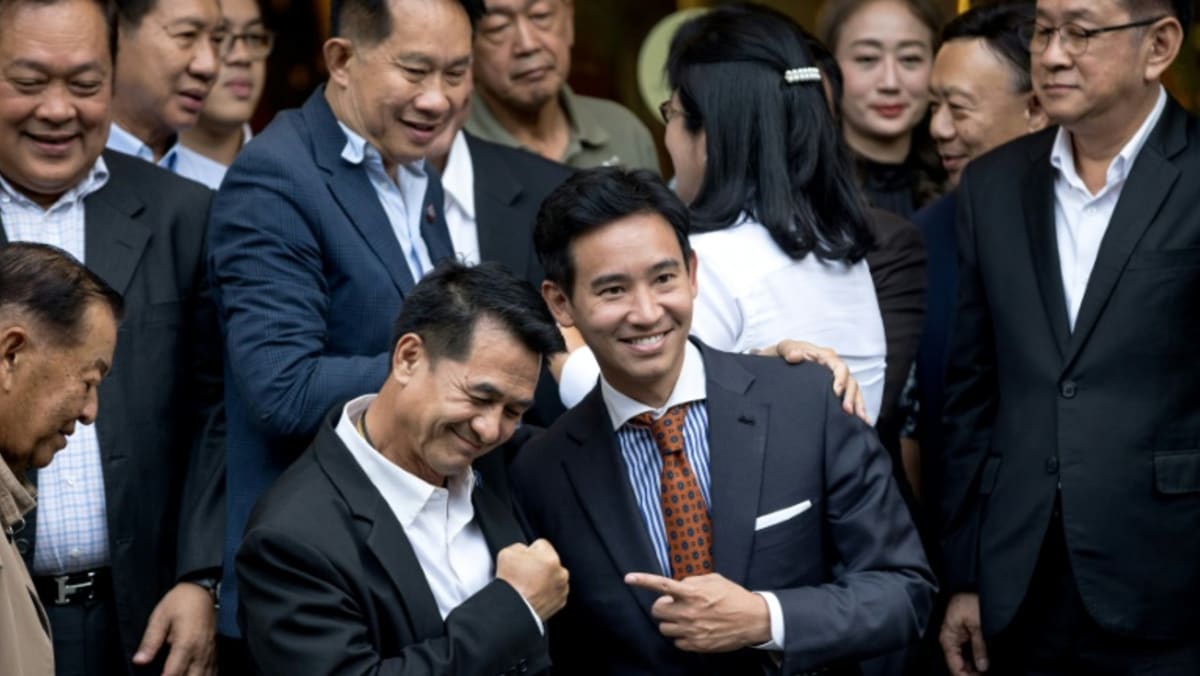
Pheu Thai is expected to field its own candidate, business tycoon Srettha Thavisin, as its prime minister nominee in the next round of voting on Jul 27.
“If Pheu Thai wants to be very democratic, the best option is to work with Move Forward. However, if Pheu Thai wants to form a government, then its best option is to work with other parties,” said Dr Paul Chambers from the Center of ASEAN Community Studies at Naresuan University in Thailand.
“Because Move Forward has already been rejected by the palace. It has already been rejected by the powers that be. And so Pheu Thai most likely will work with parties that have been in the previous government to try to form a ruling coalition,” he told CNA’s Asia Now on Thursday.
PHEU THAI “IN A VERY DIFFICULT POSITION”
However, Pheu Thai has to “really evaluate” whether forming a new coalition that excludes Move Forward would be politically viable in the future, said Assistant Professor Surachanee Sriyai from the School of Public Policy at Chiang Mai University.
“We’re not talking short game here (about) who’s going to become prime minister but we’re talking four years from now when the elections come around, would people still vote for Pheu Thai if Pheu Thai excludes Move Forward from this coalition,” said the academic, who wanted to be known as Asst Prof Hammerli.
CNA Explains: What’s happening in Thai politics and how could it potentially play out?
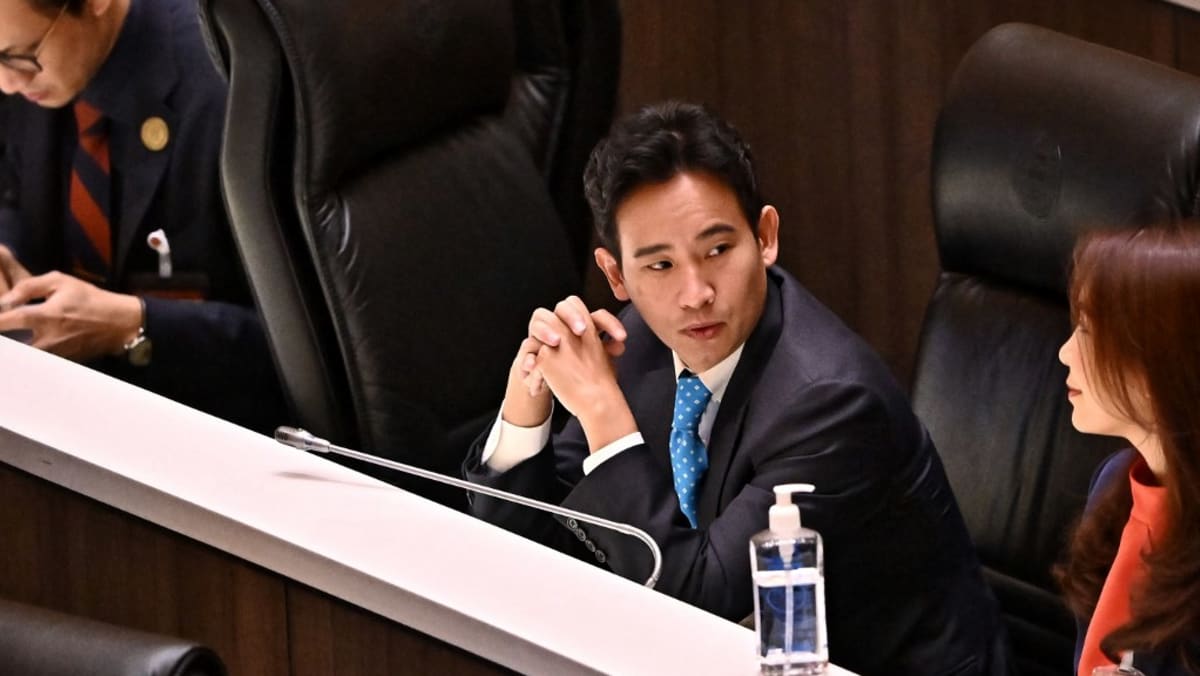
BANGKOK: Two months after the Thai general election in May, electoral winner Move Forward Party was blocked by parliament from forming a government on Wednesday (Jul 19).
Its leader and sole prime ministerial candidate Pita Limjaroenrat bade farewell to parliament after the Constitutional Court suspended him from duties as a member of parliament (MP) over shares in a defunct media company.
The court order – issued during a parliamentary debate on Mr Pita’s bid for the premiership – was followed by a vote that barred him from being renominated as prime minister, dealing a crushing blow to Move Forward.
Mr Pita had failed in his initial bid to be the prime minister on Jul 13.
Parliament is scheduled to reconvene on Jul 27 to select the 30th prime minister of Thailand.
CNA looks at what could happen next as the Move Forward-led coalition is forced to come up with a new prime ministerial candidate from another party.
WHO CAN FORM THE NEXT GOVERNMENT?
Electoral runner-up Pheu Thai Party is poised to lead the forming of the next government. It is currently part of an eight-party coalition that commands a clear majority in the 500-seat House of Representatives – the Lower House.
The alliance includes Move Forward, Pheu Thai, Prachachat, Thai Liberal Party, Thai Sang Thai, Fair, Plung Sungkom Mai and Pue Thai Rumphlang. Together, they have 312 seats.
However, Pheu Thai needs more support to secure the premiership and form the government.
The current constitution stipulates that a prospective prime minister must have the approval from more than half of the combined assembly, which includes 249 senators from the Upper House.
This means Pheu Thai needs at least 375 votes when parliament reconvenes next week to select the prime minister – either from both Houses or the Lower House alone.
CAN PHEU THAI FORM THE GOVERNMENT WITH MOVE FORWARD?
Given what happened in the previous prime ministerial selection, Pheu Thai’s chance to succeed is slim if Move Forward remains in the coalition.
Mr Pita only managed to secure 324 votes in the initial choosing of the prime minister, while 182 people voted against him and 199 others abstained. Many of them opposed his party’s policy to amend the royal defamation law or Section 112 of the Thai Criminal Code.
PM Lee and DPM Wong did not reveal Iswaran arrest as it was related to CPIB’s ‘operational matters’, says PMO

SINGAPORE: In their respective comments on the anti-graft probe involving Transport Minister S Iswaran, both Prime Minister Lee Hsien Loong and Deputy Prime Minister Lawrence Wong did not want to deviate from what the Corrupt Practices Investigation Bureau (CPIB) had announced in its initial statement on the investigation as it was “related to operational matters”, the Prime Minister’s Office (PMO) said on Thursday (Jul 20).
This was revealed as part of a correction direction issued to Political Sophistry, a blog on Singapore politics, under the Protection from Online Falsehoods and Manipulation Act (POFMA).
In its article “Upfront and transparent? A timeline of the CPIB investigation into Transport Minister Iswaran” published on Jul 16, the blog suggested that DPM Wong “deliberately withheld information” as he wanted to “conceal the truth”, said PMO.
PMO said in its press release that these statements were false.
On Jul 12, CPIB issued a press release stating that Mr Iswaran was assisting the bureau with an investigation.
Mr Lee’s statement and Mr Wong’s media interview conducted on the same day kept to what CPIB had announced. The reason for this, said PMO, was that: “It is CPIB’s call to make, on the operational information it was comfortable to provide in the CPIB’s press releases.”
Two days later, CPIB provided an update in response to media queries stating that Mr Iswaran and property tycoon Ong Beng Seng were both arrested on Jul 11 and subsequently released on bail.
The blog, Political Sophistry, started in February this year, publishes commentaries regarding Singapore politics.
Topics include the Ridout Road debate – in which two senior ministers rented state properties – as well as the government’s handling of the resignations of parliamentary speaker Tan Chuan-Jin and lawmaker Cheng Li Hui..
As part of the correction direction, the blog will be required to publish a correction notice and provide access to the correct facts.
A check by CNA on Thursday evening showed that Political Sophistry had put up a correction notice on its home page.
Why Russia withdrew from the Ukraine grain deal
The Russia-Ukraine grain deal that has been critical to keeping global food prices stable and preventing famine is currently in tatters.
On July 17, 2023, Russia said it was pulling out of the year-old deal, which allowed shipments of grains and other foodstuffs to travel past the Russian naval blockade in the Black Sea. And to make matters worse, over the next two days Russia bombed the Ukrainian grain port of Odesa, destroying over 60,000 tons of grain.
As a result, food prices have surged, with the cost of wheat, corn and soybeans in Europe, the Middle East and elsewhere all skyrocketing.
So, what is the grain deal, and why is it so important to the global food supply chain?
Anna Nagurney is an expert on supply chains, including those involving perishable products like food, and is co-chair of the board of directors overseeing the Kiev School of Economics in Ukraine.
She explains how important Ukrainian grain is to feeding the world – and why the Black Sea is a vital route to getting it to people who need it.
What makes Ukraine such an important part of the global food supply chain?
Ukraine has been called the breadbasket of Europe and is a major supplier of wheat, barley, sunflower products and corn to Europe as well as to developing countries such as in the Middle East, Northern Africa and China.
More than 400 million people relied on foodstuffs from Ukraine before Russia invaded Ukraine in February 2022.

One key reason for that is Ukraine has approximately one-third of the world’s most fertile soil, which is known as chernozem, or black soil. And before the war, Ukraine was able to rely on its year-round access to ice-free harbors in the Black Sea to ship grains to nearby markets in the Middle East and Africa.
What happened when war broke out?
Even before the war, famine was increasing across the globe. Russia’s invasion made it a lot worse.
From 2019 to 2022, more than 122 million people were driven into hunger by a combination of the impacts of climate change, the Covid-19 pandemic and the war in Ukraine, the United Nations said in a recent report. Other researchers have suggested global hunger is the highest it’s been since at least the early 2000s.
From February to June 2022, at least 25 million tons of Ukrainian grain intended for global markets got trapped in Ukraine because of Russia’s naval blockade, causing food prices to jump.
How did the grain deal come about?
The UN and Turkey brokered what is officially known as the Black Sea Grain Deal with Ukraine and Russia on July 22, 2022.
The agreement allowed for the secure passage of agricultural products from Ukraine from three ports on the Black Sea, including its largest port, Odesa. While the original agreement was to last 120 days, it has been extended several times since.
Ukraine has exported more than 32 million tons of food products through the Black Sea since August 2022. The World Food Program, the world’s largest humanitarian agency, purchased 80% of its wheat from Ukraine. Ethiopia, Yemen, Afghanistan and Turkey have been the biggest recipients of humanitarian shipments.
The UN has estimated that the grain deal has reduced food prices by more than 23% since March 2022.
The amount of grain shipped per month had already been falling before the deal fell apart in July 2023, from a peak of 4.2 million metric tons in October to about 2 million tons in June. This is primarily because of slowdowns in the number of inspections Russians had been conducting before ships could exit the Black Sea.
Another problem generally is falling production. Ukraine is expected to produce 31% less wheat, barley, corn and other crops during the current season that it did before the war. And this estimate came before the destruction of a key Ukrainian dam flooded fields.

Why is the Black Sea so important for Ukrainian exports?
Colleagues at UMass Amherst and the Kyiv School of Economics and I published a study in May 2023 that showed just how vital the Black Sea ports are to ensuring Ukrainian grain gets out to the world. Before the war, 90% of Ukraine’s agricultural exports were transported on the Black Sea.
While Ukraine also ships its grain and other food over land through Europe, doing so costs a lot more and takes more time than sea exports. And transportation costs over land were rising because of the war as a result of mines, the destruction of agricultural infrastructure and other challenges.
Why is Russia pulling out of the deal?
Russia has threatened to exit the deal before, but each time it has chosen to stay in.
But on July 17, 2023, it said it’s unwilling to stay in the deal unless its demands are met to ship more of its own food and fertilizer. Over the following two days, it attacked Odesa with drones and missiles in one of the largest sustained assaults on the port.
Russia also said it would deem any ship in the Black Sea bound for a Ukrainian port to be a legitimate military target.
This caused the price of critical commodities such as wheat and corn to soar and created vast uncertainty and global concern around hunger. Chicago wheat futures, a global benchmark, are up about 17% since Russia left the deal.
While Russia has extended the deal after previous threats, this time may be different. Russian strikes caused extensive damage to Odesa, which may severely limit Ukraine’s ability to export through the port in the future – deal or no deal.
I believe Russian leader Vladimir Putin is weaponizing food at a time of growing hunger. I only hope goodwill prevails and somehow Ukraine’s vital exports are allowed to continue.
Anna Nagurney is Professor and Eugene M Isenberg Chair in Integrative Studies, UMass Amherst
The writer does not work for, consult, own shares in or receive funding from any company or organization that would benefit from this article, and has disclosed no relevant affiliations beyond their academic appointment.
This article is republished from The Conversation under a Creative Commons license. Read the original article.
Charter expert: Rejecting Pita’s renomination unconstitutional
Former charter drafter Borwornsak Uwanno says Constitutional Court should be asked to rule
PUBLISHED : 20 Jul 2023 at 16:57

Former charter drafting chairman Borwornsak Uwanno says parliament’s resolution on Wednesday to reject the renomination of Move Forward Party leader Pita Limjaroenrat for prime minister was unconstitutional.
The legal expert said he hoped that someone would petition the Constitutional Court to issue a timely ruling
“Invoking a parliamentary session regulation has crippled the constitution despite the fact that the charter specifically stipulates the prime ministerial election. It’s a pity for Thailand,” he wrote on his Facebook page on Thursday.
Mr Borwornsak, former chairman of the now-defunct Constitution Drafting Committee, said he was disappointed with MPs who voted against Mr Pita’s renomination.
“Although you are in the opposition, you should be aware of when to do away with being in the opposition to do the right thing,” he wrote.
He noted that parliament’s interpretation was not final. Any person who thought his or her right was affected could petition the Ombudsman that the parliamentary resolution, which was a legislative action, went against Section 213 of the constitution. Unless the Ombudsman submitted the petition to the Constitutional Court for a ruling, the affected person could directly petition the court.
“I will wait and see if parliament’s action violated the constitution,” the professor of constitutional law wrote.
“I will see how the Constitutional Court will rule on this. I have been teaching constitutional law for 30 years. Now I have to reconsider whether I will continue teaching.”
His post was widely viewed online with 8,100 shares as of 4pm on Thursday.
Mr Borwornsak’s comments came after the joint House and Senate sitting voted on Wednesday to reject the nomination of Mr Pita on the grounds that parliamentary session regulation No.41 prohibited the resubmission of a failed motion during the same parliamentary session.
Parliament president Wan Muhamad Noor Matha made the announcement after 715 parliamentarians voted electronically about 5.10pm. A total of 394 parliamentarians, most of them unelected senators, voted against Mr Pita’s renomination, 312 voted to support it, eight abstained and one did not exercise the right to vote.
On Tuesday, Mr Pita admitted he was worried that any attempts to use parliamentary procedure to block him from being nominated a second time would affect the entire system because it would be politically binding and that may affect other parties. From now on, every prime ministerial candidate would have only one shot at securing a majority vote.
The Move Forward Party said on Thursday that it believed it had a legal case to renominate Mr Pita for the next vote on July 27.

